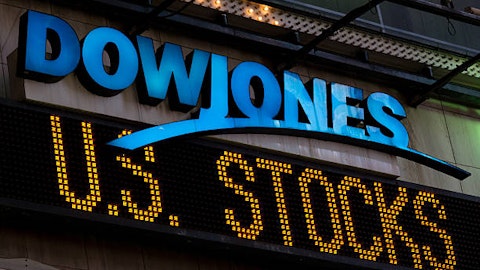We came across a bullish thesis on Merck & Co., Inc. (MRK) on Substack by Long-Term Pick. In this article, we will summarize the bulls’ thesis on MRK. Merck & Co., Inc. (MRK)’s share was trading at $85.67 as of Feb 12th. MRK’s trailing and forward P/E were 12.71 and 9.50 respectively according to Yahoo Finance.

A doctor in a white coat discussing clinical trial results with a patient in an oncology practice.
Merck’s fair price estimate has been updated to $188, reflecting stronger-than-expected earnings growth over the past three years. While this valuation remains well above the current market price, the increase is justified by improved EPS growth trends. However, the company’s future valuation has been adjusted with a lower exit P/E across all scenarios—base, bull, and bear—factoring in potential risks. The recent stock price decline is largely due to weaker-than-expected 2025 revenue guidance, with projected revenue of $64.1 billion to $65.6 billion falling short of analyst estimates of $67.31 billion. Additionally, Merck temporarily halted shipments of its HPV vaccine Gardasil to China until mid-2025, which has negatively impacted its revenue outlook.
Despite these short-term challenges, Merck delivered a strong performance in 2024, driven by robust demand for its innovative portfolio. Keytruda continued to perform exceptionally well, and the successful launch of Winrevair further bolstered revenue growth. The company’s reach expanded significantly, with nearly half a billion people benefiting from its medicines and vaccines. Merck’s pipeline remains a major strength, with 20 potential new growth drivers, many of which hold blockbuster potential. Its Animal Health division also delivered impressive results, achieving 13% sales growth. Furthermore, the company’s late-stage pipeline in oncology, cardiometabolic, and infectious diseases positions it well for long-term growth.
However, challenges remain. Gardasil sales fell by 18%, primarily due to weaker demand in China, leading to elevated inventory levels. The decision to pause Gardasil shipments will weigh on revenue in the near term, and macroeconomic headwinds in China create uncertainty regarding long-term sales recovery. Additionally, the redesign of Medicare Part D is expected to reduce sales by approximately $400 million, affecting products such as Winrevair and certain small-molecule oncology drugs.
Even with these headwinds, Merck remains an attractive long-term investment. The company’s innovation pipeline, strong commercial execution, and diversified portfolio provide resilience against short-term disruptions and its long-term growth trajectory remains intact.
Merck & Co., Inc. (MRK) is not on our list of the 30 Most Popular Stocks Among Hedge Funds. As per our database, 86 hedge fund portfolios held MRK at the end of the third quarter which was 96 in the previous quarter. While we acknowledge the risk and potential of MRK as an investment, our conviction lies in the belief that some AI stocks hold greater promise for delivering higher returns, and doing so within a shorter timeframe. If you are looking for an AI stock that is more promising than MRK but that trades at less than 5 times its earnings, check out our report about the cheapest AI stock.
READ NEXT: 8 Best Wide Moat Stocks to Buy Now and 30 Most Important AI Stocks According to BlackRock.
Disclosure: None. This article was originally published at Insider Monkey.




